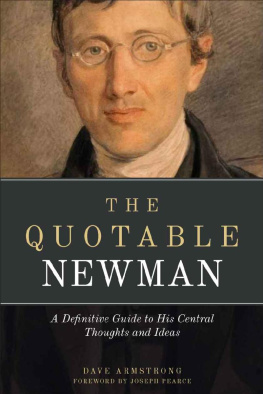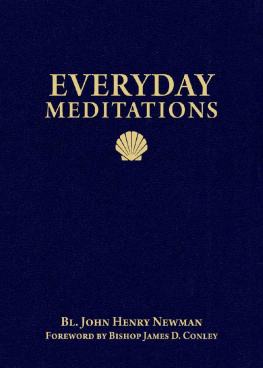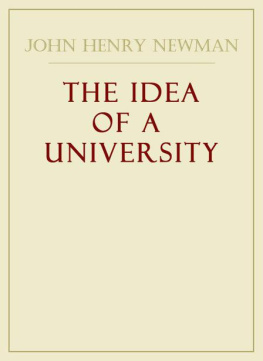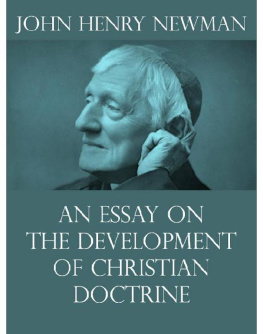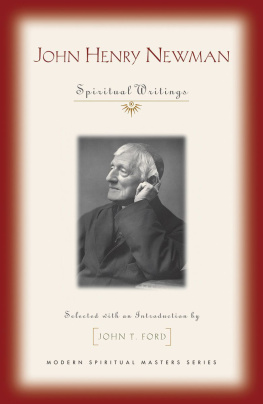PRAYERS, VERSES, AND DEVOTIONS
John Henry Newman
PRAYERS, VERSES, AND
DEVOTIONS
The Devotions of Bishop Andrewes
Meditations and Devotions
Verses on Various Occasions
IGNATIUS PRESS SAN FRANCISCO
The Devotions of Bishop Andrewes
was first published in 1843
by John Henry Parker, Oxford and London
Meditations and Devotions
was first published in 1903
by Longmans, Green, and Co.,
London and New York
Verses on Various Occasions
was first published in 1903
by Longmans, Green, and Co.,
London, New York, and Bombay
Permission to reproduce George Richmonds
illustration of John Henry Newman
was kindly granted by
The Friends of Cardinal Newman
The Birmingham Oratory
Cover design by Roxanne Mei Lum
2000 Ignatius Press, San Francisco
All rights reserved
ISBN 978-0-89870-808-0
Library of Congress control number 88-81571
Printed in the United States of America
CONTENTS
, by Louis Bouyer of the Oratory
Times of Prayer
Places of Prayer
Circumstances of Prayer
Litany
Confession
Commendation
Meditation
Confession
Commendation
(for each day, under the five acts of Confession, Prayer for Grace, Profession, Intercession , and Praise , with an Introduction ).
First Day
Second Day
Third Day
Fourth Day
Fifth Day
Sixth Day
Seventh Day
Deprecation
A Litany of Deprecation
F ORMS OF I NTERCESSION.
First
Second
Third
Fourth
M EDITATIONS.
On Christian Duty
On the Day of Judgment
On Human Frailness
A P REPARATION FOR H OLY C OMMUNION
, by W. P. Neville
Meditations on the Litany of Loretto
for the Month of May
1. May the Month of Promise
2. May the Month of Joy
1. Virgo Purissima (The Most Pure Virgin)
2. Virgo Praedicanda (The Virgin Who Is to Be Proclaimed)
3. Mater Admirabilis (The Wonderful Mother)
4. Domus Aurea (The House of Gold)
5. Mater Amabilis (The Lovable or Dear Mother)
Rosa Mystica (The Mystical Rose)
6. Virgo Veneranda (The All-Worshipful Virgin)
7. Sancta Maria (The Holy Mary)
1. Regina Angelorum (The Queen of Angels)
2. Speculum Justitiae (The Mirror of Justice)
3. Sedes Sapientiae (The Seat of Wisdom)
4. Janua Coeli (The Gate of Heaven)
5. Mater Creatoris (The Mother of the Creator)
6. Mater Christi (The Mother of Christ)
7. Mater Salvatoris (The Mother of the Saviour)
1. Regina Martyrum (The Queen of Martyrs)
2. Vas Insigne Devotionis (The Most Devout Virgin)
3. Vas Honorabile (The Vessel of Honour)
4. Vas Spirituale (The Spiritual Vessel)
5. Consolatrix Afflictorum (The Consoler of the Afflicted)
6. Virgo Prudentissima (The Most Prudent Virgin)
7. Turris Eburnea (The Ivory Tower)
1. Sancta Dei Genitrix (The Holy Mother of God)
2. Mater Intemerata (The Sinless Mother)
3. Rosa Mystica (The Mystical Rose)
4. Turris Davidica (The Tower of David)
5. Virgo Potens (The Powerful Virgin)
6. Auxilium Christianorum (The Help of Christians)
7. Virgo Fidelis (The Most Faithful Virgin)
8. Stella Matutina (The Morning Star)
, with Prayer for the Faithful Departed:
1. Jesus the Lamb of God
2. Jesus the Son of David
3. Jesus the Lord of Grace
4. Jesus the Author and Finisher of Faith
5. Jesus the Lord of Armies
6. Jesus the Only Begotten Son
7. Jesus the Eternal King
8. Jesus the Beginning of the New Creation
9. Jesus the Lover of Souls
10. Jesus Our Guide and Guardian
11. Jesus Son of Mary
12. Jesus Our Daily Sacrifice
Litany of Penance
Litany of the Passion
Litany of the Seven Dolours
Litany of the Resurrection
Litany of the Immaculate Heart of Mary
Litany of the Holy Name of Mary
Anima Christi (Translated)
The Heart of Mary
A Short Service for Rosary Sunday.
Ave Maris Stella
A Triduo to St. Joseph
Four Prayers to St. Philip
A Short Road to Perfection
Prayer for the Light of Truth
Prayer for a Happy Death
Meditations on Christian Doctrine
1. The Mental Sufferings of Our Lord
2. Our Lord Refuses Sympathy
3. The Bodily Sufferings of Our Lord
4. It Is Consummated
1. God the Blessedness of the Soul
2. Jesus Christ Yesterday and To-day, and the Same For Ever
3. An Act of Love
1. Against Thee Only Have I Sinned
2. Against Thee Only Have I Sinned
3. The Effects of Sin
4. The Evil of Sin
5. The Heinousness of Sin
6. The Bondage of Sin
7. Every Sin Has Its Punishment
1. The Temples of the Holy Ghost
2. God Alone
3. The Forbearance of Jesus
1. The Familiarity of Jesus
2. Jesus the Hidden God
3. Jesus the Light of the Soul
1. The Kingdom of God
2. Resignation to Gods Will
3. Our Lords Parting with His Apostles
4. Gods Ways Not Our Ways
1. He Ascended
2. He Ascended into Heaven
3. Our Advocate Above
4. Our Advocate Above
1. The Paraclete, the Life of All Things
2. The Paraclete, the Life of the Church
3. The Paraclete, the Life of My Soul
4. The Paraclete, the Fount of Love
1. The Mass
2. Holy Communion
3. The Food of the Soul
Carmina Ecclesiastica .
Exercitationes qudam in Terentii fabulas .
Translation of the Above
INTRODUCTION
N EWMAN is not what the Christians of the last few centuries have come to mean by a spiritual writer. He does not try to move his readers to devotion by emotionally soliciting their turning to God and having recourse for this effect to analyses and suggestions based upon psychological insight. For Newman is not one of those modern theologians who have tried to nourish piety mainly with psychologicalwhen not just emotionalconsiderations and devices, like Gerson at the end of the Middle Ages, who had to turn to psychology after recognizing the desiccation of his own theology due to its too successful adaptation to the model of Aristotelian science.
Of Newman, rather, must be said what was already true of those theologians of the first generation of what we call Christian humanistslike Erasmus, Bartolomeo Carranza, Morrone or Pole, or later Petau and Thomassinall Catholicsor Anglicans like Hooker and his heirs, the Caroline Divines, or even Lutherans of the same period and tendencies, like Johann Gerhard: I mean that for all these as for Newman, who in this followed their example, the rediscovery of the great Fathers of the Church, especially the Greek Fathers, led to a fresher look at the Bible and created in their time a new way of doing theology that had in fact been that of all the early Christians. For these, theology and spirituality could never be divorcednor even distinguishedfrom one another. We should even say more: Newman, along with the Christian humanists of the Renaissance, followed the vision represented by the ancient Christian thinker known as Pseudo-Dionysius. However saturated this Father might be by philosophy, for him mystical theology would not have meant some scientific theology applied to mysticism but the mystical experience itself, as constituting the highest possible knowledge of God.
In this sense we may say of Newman, as well as of all those Christian thinkers just mentioned, that it is as spiritual writer that he theologizes and as theologian that, indeed, he is a spiritual writer, but in the sense that this phrase would have had for the Fathers themselves or for their disciples of the sixteenth and seventeenth centuries.
Among these Cardinal Bona, one of the first great liturgiologists of modern times, and Lancelot Andrewes, among the Anglicans, would have agreed with Newmans realization that all of us moderns are more or less in need of some pedagogy to restore us to the possibility of a lectio divina as practiced by the ancient Christians: a reading of Scripture leading us, not to a purely abstract meditation of the Word of God, but to its vital assimilation, which alone befits it as the Word of Life it essentially is. This is why Andrewes, like Bona, composed centos of scriptural, liturgical, or simply traditional sentences likely to develop devotion in us systematically, but not through largely artificial devices. Rather, these centos group together and offer us their material in a clear and coherent order, according to the different subjective reactions that the objective history of revelationor, for that matter, the objective revelation in historywas intended to evoke in us.
Next page
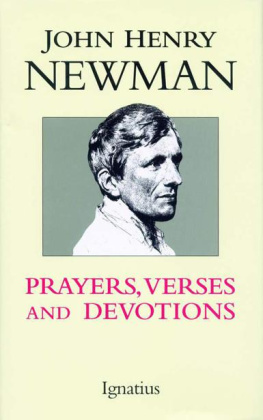
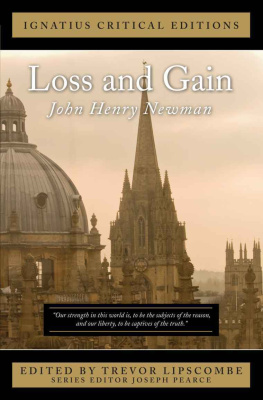
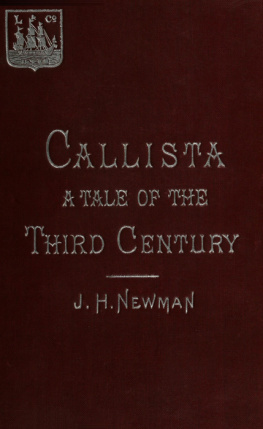
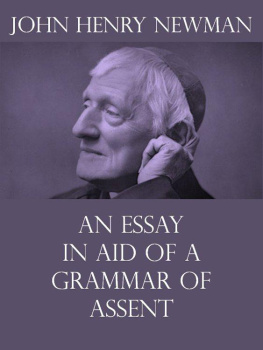
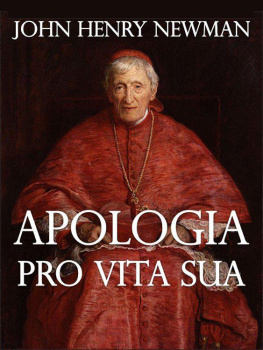

![Blessed John Henry Newman - Blessed John Henry Newman Collection [26 Books]](/uploads/posts/book/371011/thumbs/blessed-john-henry-newman-blessed-john-henry.jpg)


